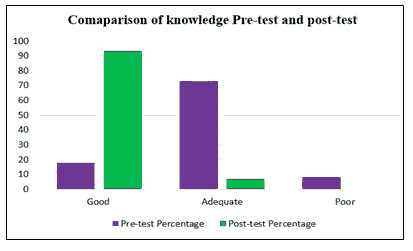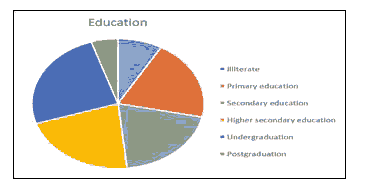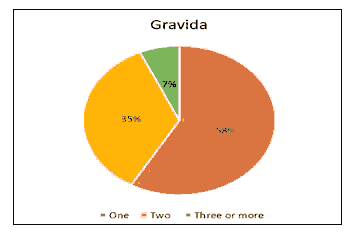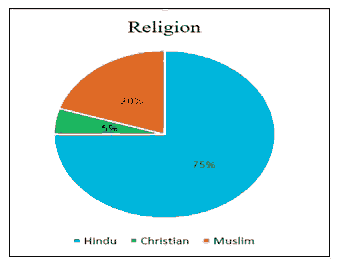Research Article - (2021) Volume 9, Issue 12
A Study to Analyse the Impact of an Educational Programme on Breast Care Awareness among Young Mothers after Childbirth
*Correspondence: AR. Bharathi, Department of Nursing, Bharath Institute of Higher Education and Research, Selaiyur, Chennai, Tamil Nadu, India, Email:
Abstract
The postpartum period, also known as the puerperium and the "fourth trimester," refers to the time after delivery when maternal physiologic changes related to pregnancy return to the non-pregnant state. From the day of delivery to six-eight weeks after delivery is termed as the fourth trimester. A few days after birth, the mother’s breast will swell with milk and become tender and painful. This is called engorgement. Breast care is necessary postnatally since this will avoid complications such as mastitis – infection caused due to trapped milk. Post natal education on breast care is much needed for all mothers. Often, even well educated women seem to know very less about breast care post childbirth. Hence the present study was framed to assess on how much knowledge the new mothers possess about breast care. From the results obtained we conclude that all the new mothers post the awareness rendered about breast care acquired good or adequate knowledge regarding the same when compared to pre-test. This emphasizes the need for public health interventions and awareness programs to educate as well as minimize the related complications.
Keywords
Breast Care, Postpartum Period, Post natal education, Swelling, lumps, distortionIntroduction
The postpartum period, also known as the puerperium and the "fourth trimester," refers to the time after delivery when maternal physiologic changes related to pregnancy return to the nonpregnant state. From the day of delivery to six-eight weeks after delivery is termed as the fourth trimester [1]. A few days after birth, the mother’s breast will swell with milk and become tender and painful. This is called engorgement. Breast care is necessary postnatally since this will avoid complications such as mastitis – infection caused due to trapped milk. Some ideas for after birth breast care are as follows - Using warm or cold compress for the pain, increasing the frequency of breastfeeding to prevent clogging, alternating feeding positions, choosing proper inner ware and massaging the breasts to avoid swelling and flat nipples. If swelling with pain or fever persists one needs to see the doctor. To prevent sore nipples proper latching of baby on the breast, letting a few drops of milk dry on the nipples, not using alcohol, soap, or scented cleansers on your breasts, avoiding wearing plastic nursing pads, etc. can help [2].
Often, even well educated women seem to know very less about breast care post childbirth. In a study by Perez et al [3] the causal relationship between maternity ward practices and lactation success methods was studied and they concluded saying that hospital-based breast-feeding interventions can have a beneficial effect on lactation.
Post natal education on breast care is much needed for all mothers. The World Health Organization along with United Nations Children's Fund Global Strategy for Infant and Young Child Feeding has proposed the BFHI - The Baby-friendly Hospital Initiative [4]. The main objective of this initiative was to examine the impact of BFHI implementation on breastfeeding and child health outcomes worldwide. Considering this, the present study was framed to assess on how much knowledge the new mothers possess about breast care and how a small educational initiative on breast care would help improve their knowledge.
Methodology
The data was collected from 60 people (Female only age group 20-40 years) and analyzed according to objectives of the study.
Research approach
Quantitative research approach was used for this study.
Research design
Descriptive design was adapted for the study.
Setting of the studies
The study was conducted at a Government hospital, Chennai on 60 post natal mothers (20 to 40 years).
Population
The samples consisted postnatal mother's (20 to 40 year's) at a Government hospital, Chennai.
Sample Size
The sample size was 60 mothers.
Sampling Technique
A non-probability purposive sampling technique was adapted to the selected samples in the study.
Description of the tools
The tool consists of two sections.
Section 1: This section consists of an interview schedule to assess the demographic characteristic such as age, educational status, gravida and religion of the selected mothers.
Section 2: Multiple choice question to assess the knowledge on breast care.
Criteria for scoring
Section 1: No scoring
Section 2: The knowledge questionnaire consists of 20 questions totally. Each question with a correct answer will be given 1 mark & incorrect answer carries no mark the total scoring for over all knowledge was 20. To interpret the level of knowledge of breast care the score was converted to percentage and were classified.
Results and Discussion
The study carried out by Dhandapany G (2008) on antenatal counselling on breast feeding and postnatal lactation support at Mahatma Gandhi Medical College and research institute, Pondicherry India, is in correlation with the present study [5]. Breast milk contains exactly the nutrients a baby needs and is easily digested and used by the baby's body. It also protects the baby against infection. A few days after birth, the mother’s breast will swell with milk and become tender and painful. This is called engorgement. Breast feeding is recommended from the first hour of birth upto six month of child birth [6]. Dr. Henriette Moll, a professor of Pediatrics at Erasmus Medical Centre in Rotterdam insists on support health policy strategies to promote exclusive breast feeding for at least 4 month and preferably 6 months [6]. Breast care is necessary postnatally since this will avoid complications such as mastitis – infection caused due to trapped milk. The awareness of proper breast care after childbirth seems to be very low among new mothers as shown in the present study. In accordance with the present study, Perez et al [3] concluded saying that hospital-based breast-feeding interventions can have a beneficial effect on lactation.
Table1: Comparing pre-test and post-test knowledge on breast care mother among antenatal and postnatal mother.
| Knowledge | Pre-test | Post-test | ||
|---|---|---|---|---|
| Frequency | Percentage | Frequency | Percentage | |
| Good | 11 | 18 | 56 | 93 |
| Adequate | 44 | 73 | 4 | 6.7 |
| Poor | 5 | 8.3 | 0 | 0 |

Figure 1: Comparing Pre-Test and Post Test Knowledge on Breast Care Mother among Antenatal and Postnatal Mother.

Figure 2: Age group of women in this study.

Figure 3: Educational status of women in this study.

Figure 4: Gravida of women in this study

Figure 5: Religion of women in this study.
Conclusion
In conclusion, the results from the current study shows that all the new mothers post the awareness rendered about breast care acquired good or adequate knowledge regarding the same when compared to pre-test. This emphasizes the need for public health interventions and awareness programs to educate as well as minimize the related complications.
Funding
No funding sources
Ethical Approval
The study was approved by the Institutional Ethics Committee
Conflict of Interest
The authors declare no conflict of interest.
Acknowledgments
The encouragement and support from Bharath Institute of Higher Education and Research, Chengalpattu, Tamil Nadu, India is gratefully acknowledged for providing the laboratory facilities to carry out the research work.
References
- Perez-Escamilla, Rafael, Pollitt Ernesto, Lönnerdal Bo, and Dewey Kathryn G. "Infant feeding policies in maternity wards and their effect on breast-feeding success: an analytical overview." Amen J Pub Healt 84, (1994): 89-97.
- Buisson, P, Tomikowski J, Santarelli J, and Kapitaniak B. "Clinical and ultrasonographic study of uterine involution in postpartum physiology." Rev franc gynecol d'obstetri 88, (1993): 12-18.
- Dennis, Cindy-Lee. "Peer support within a health care context: a concept analysis." Inte J Nurs Studi 40, (2003): 321-332.
- Guise, Jeanne-Marie, Palda Valerie, Westhoff Carolyn, and Chan Benjamin KS, et al. "The effectiveness of primary care-based interventions to promote breastfeeding: systematic evidence review and meta-analysis for the US Preventive Services Task Force." The Annals of Family Medicine 1, (2003): 70-78.
- Adegboye, Amanda R. Amorim, and Linne Yvonne M. "Diet or exercise, or both, for weight reduction in women after childbirth." Coch Data System Rev 7 (2013):1-1.
Author Info
Department of Nursing, Bharath Institute of Higher Education and Research, Selaiyur, Chennai, Tamil Nadu, IndiaCitation: Jeyarekka, AR. Bharathi A Study to Analyse the Impact of an Educational Programme on Breast Care Awareness among Young Mothers after Childbirth , J Res Med Dent Sci, 2021, 9(11): 1-4
Received: 01-Dec-2021 Accepted: 15-Dec-2021 Published: 22-Dec-2021
